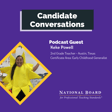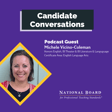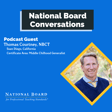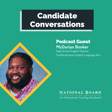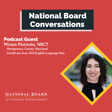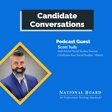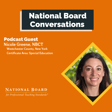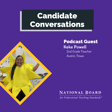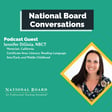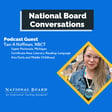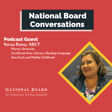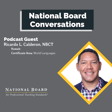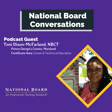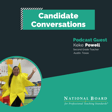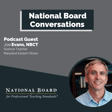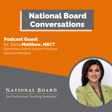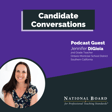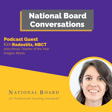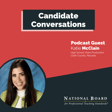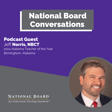Become a Creator today!Start creating today - Share your story with the world!
Start for free
00:00:00
00:00:01

Maria Peterson
Maria Peterson is National Board Certified Teacher in Montgomery County Maryland. During the pandemic she turned into a vaccine hunter helping people in her community get appointments for their vaccine getting her featured in the Washington Post, in CNN, and on Good Morning America. Maria was able to get over 30,000 people in her local community vaccine appointments. Listen to her tell her story of leadership. You can read her story in The Standard.
Be sure to follow us on all our social media platforms to keep up with all National Board related updates.
Twitter: @NBPTS
Instagram: @NBPTS
Facebook: The National Board for Professional Teaching Standards
Transcript
Introduction and Episode Teaser
00:00:00
Speaker
What's going on everyone? We got a great episode for
Interview with Maria Peterson
00:00:02
Speaker
you coming up. We take a trip to Maryland to speak to Maria Peterson. She's a national board certified teacher turned vaccine hunter. Over the course of the pandemic, she helped colleagues and other community members get appointments for their vaccines. This work has gotten her featured on Good Morning America, CNN, and in the Washington Post amongst other major media outlets. She tells us her story and how she got started with all the work and all the work it took to get done. I won't hold you any longer. Here's my conversation with Maria Peterson.
Maria's Journey from Puerto Rico to Maryland
00:00:29
Speaker
Hey Maria, how's it going today? We are doing great. How are you today? I'm doing all right. You know, another work from home day, but you know, we're getting through it. Yes, one day at a time. So we're going to start this off with a brief intro. Could you give us like a one minute intro of yourself? What's your current role, your job, and how'd you get there?
00:00:48
Speaker
Goodness, goodness. So I grew up in Puerto Rico and at the age of 18, I'm like, I'm going away for college. I wanted to go as far away as I could. I ended up in Wisconsin and then eventually I went to Maryland, Montgomery County. I knew nobody in Maryland, Montgomery County. I did know that they were recruiting because Montgomery County came to Maryland back in 94 to recruit bilingual Latino teachers. So I was like, let's do it. You know, let's come to Maryland and.
00:01:13
Speaker
I've been here since 94. I've been teaching in Montgomery County Public Schools, for Montgomery County Public Schools. I taught elementary school, fifth grade, being a native speaker of Spanish. I wanted to do something with my language, so I jumped to middle school.
Vaccine Advocacy in Marginalized Communities
00:01:28
Speaker
Now I'm doing high school and the IB program. And on the side this last year or so, my latest project with a group of friends has been all related to vaccines and helping our black and brown community where we work and teach.
00:01:43
Speaker
Yeah, and we'll definitely get into the piece you wrote about the vaccine hunting that you did. But we'll stay in the classroom real quick. Why did we end up becoming a teacher? What pushed you in that direction besides them coming to recruit you? I always wanted to be a teacher. Everybody jokes about it. It's like, oh, what are you doing with your college degree? Over half of people are not doing what they went to college for. I'm like, well, I can say that ever since elementary school, I think I had a very happy
00:02:13
Speaker
You know school, quote unquote career if you want to call it you know I enjoyed my elementary school middle school years I enjoyed my teachers, I loved high school and I went to an old girls Catholic high school in Puerto Rico. And to be honest, you know, there's 110 of us in each class there's like 400 girls in the high school.
00:02:30
Speaker
We're all friends. Like I have positive fun experiences of being in the school setting. So that was something that, you know, why not do that? If I enjoyed it so much, I can bring joy to other students. And, you know, being a minority, that's something that I feel that is needed in the classroom.
Impact of Minority Teachers
00:02:48
Speaker
You know, other Hispanic kids need to see other role models, you know.
00:02:52
Speaker
Yeah, it's huge, you know, to have somebody that looks like you in a setting like that, because I didn't have many Black or Hispanic teachers growing up, but the few that I did all left a huge impact on me, and it pushed me in the direction of not going to the streets for real, because that could have easily happened.
00:03:08
Speaker
Exactly. So yeah, that's, you know, so I became a teacher and I fully, I've enjoyed every great level that I've taught and every student that I teach, you know, it's, I love running into them, you know, now they're adults themselves. It will push you to becoming a national board certified teacher.
00:03:27
Speaker
Um, well, I'm always pushing myself. What's the next thing? What's the next thing? You know, I saw people getting national board certified and I always thought like, well, how, you know, when you look at the data and statistics and how many few people or teachers in the country are national board certified, if anything, it pushed me. I'm like, well, if that small percentage can do it, I can do it too. You know, so I, you know, once I set my mind to doing something that is it, you know, I dragged one of my colleagues at the time to do it. Cause I knew having support from another teacher was great.
00:03:57
Speaker
And we did it we did it in a year, and I learned I learned what the process was it's intimidating, but I knew that having that title in the end would bring so many more opportunities and it would give me so much room for growth because I'm, I'm a teacher, not just to be a teacher and to teach the curriculum but I'm also a teacher.
00:04:15
Speaker
to show growth and to see how I can improve myself. And just seeing my own kids and the stories they bring home from some teachers and things that happen, it's like, I don't wanna be that teacher. And I think being a national board certified makes you think about what your job is and how can you push yourself to the next level and make yourself even better for your kids.
Adapting to Virtual Teaching
00:04:42
Speaker
So in your piece, you talked about having to pretty much instantly switch to going virtual. What was the biggest challenge at the beginning of the pandemic when you had to go virtual? And what challenges do you still face now? So the biggest challenge, I would say, is they threw it off so many different platforms to connect and use. When you're teaching virtually,
00:05:08
Speaker
You're using canvas and you have it puzzles when you have food and you have, you know, like there's all these other websites that, you know, it's for the students own good to have to
00:05:22
Speaker
What was I going to say to show more variety, you know, in the lessons. So me learning all those different platforms was a big thing, you know, just taking the time. So not only am I creating lessons that are, have to be like computer friendly, but now I'm also using websites, integrating them into what I'm doing that need to work for the students. And I feel like I needed to be myself, like an expert on it because I'm going to play a game or use the website. I need to be able to explain to the students, this is how it works.
Forming a Vaccine Appointment Group
00:05:53
Speaker
So you also talked about how you and your friends came together and I think it was eight of y'all that came together to find vaccines for other educators and other people in need. How did that group come together? I know there was two NBCT's on the group and it was a total video, but how did that end up coming together at the end?
00:06:13
Speaker
That was a great, such a crazy story, such a crazy story. You know, the teachers got their opportunity to get their vaccine a year ago, January. And we all proudly displayed our vaccine card, you know, covering personal information on Facebook. And people started reaching out to us asking, wait, how did you get your appointment? How did you get your appointment? Because we didn't know it was such a big deal. Like two people have sent me links, but I didn't think much of it.
00:06:38
Speaker
And I was going to put it off and like whatever I'll get to it later I'm like I'll just make the appointment so I went down down here in Maryland we have Holy Cross hospitals so I went to Holy Cross, and eight of us you know all friends, we all had one friend in common, who is a national board certified.
00:06:54
Speaker
she reached out to us and said, hey, for example, for me, she's like, if I have you, you know, check out the Adventist Healthcare System, you know, website. Whenever they post appointments, can you share? And so she did that with eight of us, you know, seven other of us. So we were searching, you know, where were appointments available. So we created a spreadsheet with hyperlinks to different clinics in the area, because people at that time were not aware even where, where do you even go for appointments, you know, for a vaccine.
00:07:23
Speaker
So from there we created a form because then we realized if teachers are struggling so much to find appointments, keep in mind teachers are very tech savvy, teachers had been teaching virtually, you know, here you have these technology expert teachers struggling, I'm like, wait, what about the seniors? So Senior Citizen 75 and up were also
00:07:44
Speaker
eligible to get their vaccine. So now we have people who are 75 and up competing with teachers to get an appointment, one of those limited appointments, remember how hard it was. So we did a Google form, you know, we made a Facebook page, we created an Gmail account, social media all the way, you know, because teachers are all about networking and connecting.
00:08:09
Speaker
And we noticed that the people that were coming to us for help were people who live in the more affluent areas of Montgomery County. And if those of you who are listening know the area, Bethesda, Chevy Chase, Cab and John, Potomac, those are very affluent areas. And those were the kind of seniors that were coming to us via the Google form asking for help.
00:08:30
Speaker
for Hey, can you get me an appointment, when in fact, many of the clinics that were being offered were in zip code areas that were more needy, you know, Silver Spring, the white oak area.
00:08:43
Speaker
So from there, we realized that we needed to help the black and brown communities. From there, helping those people, some of them were being turned away. And that's when we really jumped in because they were showing up for their appointments, but they were being turned away and they were being profiled because they were told their passports have to be a US passport, which is not true. Some people were told their pay stubs needed to have the logo of the company, which wasn't true.
00:09:10
Speaker
From there, you know, with meetings with council members and corporate CVS, we started to bring change. And I can say right now, proudly say that at this point, we have partnered with Holy Cross Hospital and we are bringing vaccine clinics to the media's communities. There's still people, even yesterday we had a clinic, there's a dad that showed up with two kids who were coming in for their first vaccine. Like they were not even vaccinated yet, but we are, you know, we're putting,
00:09:37
Speaker
We're putting action where we say we're going to do, which is bringing clinics to the zip code areas that most people need it. That's amazing.
Media Recognition and Meeting Dr. Fauci
00:09:48
Speaker
You put an emphasis on leader and the teacher leader. Teacher needed a name. So you went on like a media world tour of CNN, Good Morning America, Washington Post. What was that like to go through in this talk?
00:10:03
Speaker
It was unreal meeting with people because at first we just wanted to make ourselves known like this is what we're doing this is the service we're offering the great thing about being bilingual and as a language teacher I'm always saying you know learn two three languages please you know you never know, but in having that second language.
00:10:22
Speaker
made such a difference because now we are reaching, not only to the non-Spanish speakers, but we're reaching out to the Latino community. So we were able to be heard, not only in the local media, but we were interviewed by, you know, like I said, Telemundo, Univision, but then we had Spanish, like from Spain, La Vanguardia, newspapers, we had French television.
00:10:45
Speaker
doing a segment. We had CNN en Español came actually here and they did a live segment here in my backyard. So not only are we able to reach out to the regular channels that everybody sees here, but we helped the CDC by
00:11:05
Speaker
they had put out a WhatsApp all about COVID vaccines, so they ran it by us to, you know, hey, how does this look? Because as we know, a lot of the Latino communities, which is one of the things we kept telling the health department is, you know, that's what they used to communicate, you know, WhatsApp, that's huge.
00:11:20
Speaker
So eventually, as in this summer, like six months, a little too late, but they finally put out a WhatsApp page about, you know, COVID vaccines and how, where could people go, you know, if you put in your SIP code where you can go to get an appointment. But I think being bilingual proves it, that proves you that, you know, there's so much more, so many more people you can reach. Right. And so you got to meet Dr. Fauci, the one and only. What was the, what was your experience with Fauci? How was that?
00:11:50
Speaker
Okay, so it was the first 2021. And if you look at the weather in DC that day, it was raining crazy. Okay, it was very bad rainy day.
00:12:02
Speaker
And, you know, some of I was going to be the one driving down. It was very official. You know, what car are you driving? We need the license plates. We need socials of all the social securities of all the women. Like they really like background checked us. And it was very like we're going to this is very like movies. We're going to meet you at the metro station from there.
00:12:20
Speaker
And I think police is going to escort you to NIH and blah, blah, blah. And we're like, okay, okay. But because of the rain, we were like, they'd reach out to us and they're like, do you want to postpone? You don't want to do it another day. And I'm like, heck no. Nobody responds for Dr. Fauci. We aren't going that day to see Dr. Fauci. So we went and they, they took us to the lobby and we waited for like 15, 20 minutes. And here out the elevator comes this,
00:12:45
Speaker
Really, you know, short little guy all smiles, you know, you can sort of tell by his face, because he's wearing, you know, a face mask but he comes down he's has his little assistant bodyguard who could probably you know, kill you with two fingers.
00:13:00
Speaker
But he gave us like half an hour of his time. He thanked us for our work, especially working with the seniors in the community. He, you know, we asked him like, what advice do you have for us? And he basically said, you know, continue what you're doing. We did some photo ops.
00:13:17
Speaker
And he also, you know, with his cute little Brooklyn accent, you know, and we took some pictures. Somebody had gifted us a kid's picture book about Dr. Fauci. He didn't write it. Somebody else did, but it was about him. I didn't bring mine because I'm like, why would I have him sign a book that he didn't write, you know?
00:13:36
Speaker
my crazy friends did and he signed them. And it was interesting enough, this is so like, this shows you the kind of person he is. My friend has four kids. So Dr. Fauci was like, okay, so what's the kids names, you know, so he can dedicate the book. And she was like, don't worry, I have four kids, it's too many, just put to the Fuentes family and don't worry about it. And he insisted on, no, I want to know the names of the four kids. And he actually took his time to write all the four names and they're all Spanish kids, you know, Spanish names and
00:14:06
Speaker
But he actually made a point to, no, no, no, I want to put everybody's name. So he did. And that kind of gives you an idea of the kind of person that he is. So we were very happy and honored to have that opportunity because the fact that he took half an hour of his life in the middle of a pandemic to meet with us, it's like, wow, amazing. So we have a story now.
00:14:28
Speaker
Yeah, I mean, you gotta start it out for the rest of your life now. This was such a huge public health campaign that you and these eight teachers that are carried on. What lessons did you learn that you could take into the classroom?
Lessons from the Vaccine Campaign
00:14:43
Speaker
I would say with my students, reach out, don't assume. You think people are doing something because they choose to do it that way. Sometimes people behave or act a certain way.
00:14:56
Speaker
because they don't know any better or because nobody has taken the time to educate them, which with the vaccines, that's something we've learned. People are always saying, oh, the Latino community doesn't want to get vaccinated. And no, all it takes is five minutes of your life talking to that person, explaining what's going on and what happens if you do or you don't get a vaccine. We're not pushing vaccines. We're helping those who want to get vaccinated.
00:15:21
Speaker
but we would go to pupusa trucks and get people right there and they're you know right there vaccinated because we had the doctor with us and that's all it takes just take time to talk to people and don't assume because you never know what their story is or why they're thinking the way it is just you know maybe they just haven't been educated.
00:15:40
Speaker
Awesome, well thank you for your hard work doing this.
Personal Insights
00:15:42
Speaker
One thing I like to do on this podcast is get to know y'all a little bit from before school or like outside the classroom. So I'm gonna come at you with three questions that are a little bit different. What was your first ever job?
00:15:55
Speaker
My first ever job was at a water park in Puerto Rico. And, you know, water parks are like the cool thing when you're in high school, teenagers, oh, you work at a water park. And I got called in to work and I was so excited and I showed up. Well, they had messed up and thought that I was lifeguard certified. I'm like, no, I'm not lifeguard certified.
00:16:17
Speaker
But I think I think Eddie I think they felt bad because they had called me in for a job interview, and they were hiring people to like the people that walk around and sweep and pick up trash from the floor with a broom and a little. So they offer me that job and I'm like, I just want a job here yes I'll take it so here I was in high school like the most disgusting.
00:16:36
Speaker
job because the cleaning and the water park sweeping wasn't bad. It was just at the end of the night when people went home, we were cleaning the bathrooms. Oh man. Why is there a 16 year old cleaning a bathroom in Puerto Rico at this water park that I know is hot and sticky and oh man. I just thought that was that was the worst you know the hairs and the drain I'll never forget.
00:17:01
Speaker
But I was so proud to say that at work at the water park. Hey, listen, you were the cool one in high school. I know. All right, so what is your favorite traditional holiday?
00:17:12
Speaker
traditional holiday, I think Three Kings, just because that's something that I bring back from growing up in Puerto Rico. That's something that is not known here. And, you know, as my kids get older, they're appreciating more of the holidays that, you know, I grew up with that, maybe when they were younger, they're like, oh, Three Kings, why the camel comes to our house, that social stuff. But, you know, it brings great memories. And I think it's, you know, it's a cute, you know, tradition.
00:17:39
Speaker
I empathize with you kids. I'm starting to appreciate the holidays more as I get older too. I'm pushing 30 this year and I'm like, man, the holidays are all right. So last one, what is the book that you read previously that you want to reread? I actually just read
00:17:58
Speaker
I actually just read this one the other day, culturally responsive teaching and the brain. Just because actually I did a presentation for national boards here at Impicci County. They had like a little symposium maybe a month ago and my friend invited me to be a speaker so anything regarding academics is big because
00:18:21
Speaker
It's my 27th year teaching and I'm still learning, you know? And I think it's important to know how the kid's brain and learning happens so you then have idea how to teach, what do you need to teach, you know? So like I said, this one is the latest that I reread and I highly recommend it.
00:18:42
Speaker
Well, thank you. Thank you. This was a lot of fun. What an amazing story and a great display of leadership in tough times. I just want to say thanks again to Maria for taking the time to chat with me and thank you for taking the time to listen to National Board Conversation. Be sure to follow us on all social media to stay up to date with everything National Board related, and we'll see you next time.
